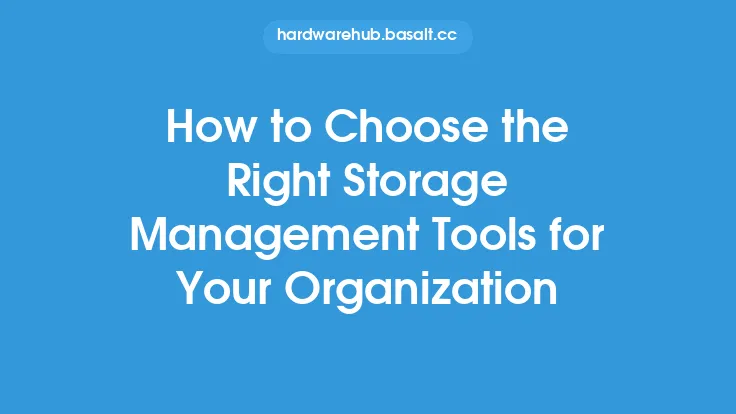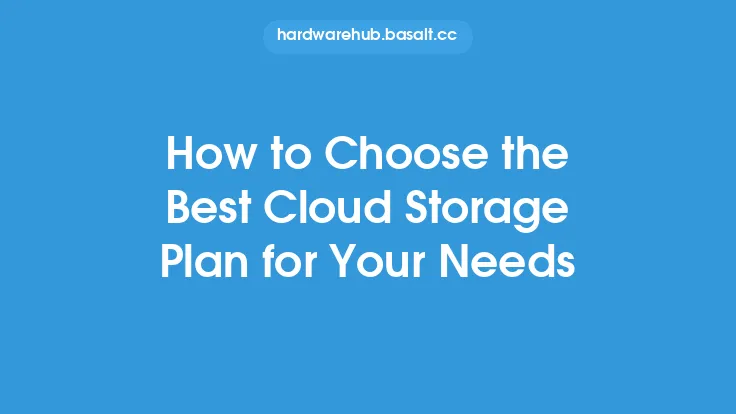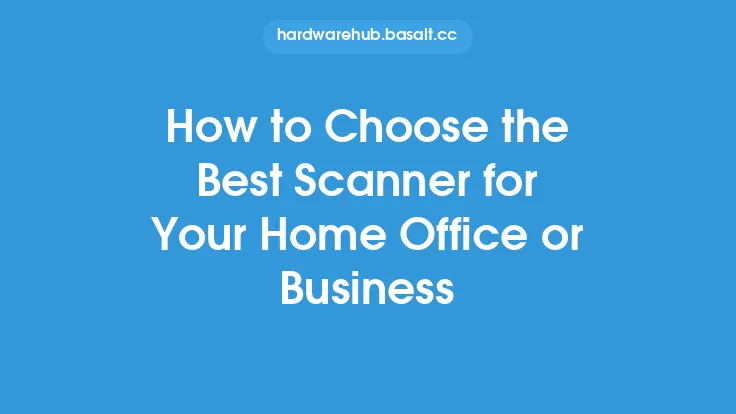When it comes to choosing the right network attached storage (NAS) for your business, there are several factors to consider. The first step is to assess your business's storage needs. This includes determining the amount of storage space required, the number of users who will be accessing the NAS, and the types of files that will be stored. It's also important to consider the level of data protection and security needed, as well as any compliance requirements that must be met.
Understanding Business Storage Needs
To determine the right NAS for your business, you need to understand your storage needs. This includes considering the types of files that will be stored, such as documents, images, videos, or databases. You should also think about the number of users who will be accessing the NAS and the frequency of access. Additionally, consider the level of data protection and security needed, such as encryption, access controls, and backup capabilities. By understanding your business's storage needs, you can choose a NAS that meets your requirements and provides the necessary performance, capacity, and features.
Evaluating NAS Options
Once you have a clear understanding of your business's storage needs, you can start evaluating NAS options. There are several types of NAS devices available, including desktop NAS, rackmount NAS, and cloud-based NAS. Desktop NAS devices are designed for small to medium-sized businesses and are typically compact and easy to use. Rackmount NAS devices are designed for larger businesses and are typically more powerful and scalable. Cloud-based NAS devices provide a flexible and scalable storage solution, but may require a reliable internet connection. When evaluating NAS options, consider factors such as storage capacity, performance, scalability, and features such as data protection, security, and management tools.
Considering Performance and Scalability
Performance and scalability are critical factors to consider when choosing a NAS for your business. You need to ensure that the NAS can handle the required workload and provide fast access to files. Consider the processor speed, memory, and storage type, as well as the number of disks and the RAID configuration. A faster processor and more memory can improve performance, while a higher number of disks and a robust RAID configuration can provide better data protection and scalability. Additionally, consider the NAS's ability to scale up or out, such as adding more disks or expanding to a cluster configuration.
Data Protection and Security Features
Data protection and security are essential considerations when choosing a NAS for your business. You need to ensure that your data is protected from unauthorized access, corruption, or loss. Look for NAS devices that provide features such as encryption, access controls, and backup capabilities. Encryption can protect data from unauthorized access, while access controls can restrict access to authorized users. Backup capabilities, such as snapshotting and replication, can provide an additional layer of data protection. Additionally, consider the NAS's compliance with industry standards and regulations, such as HIPAA or PCI-DSS.
Management and Maintenance
Management and maintenance are also important considerations when choosing a NAS for your business. You need to ensure that the NAS is easy to manage and maintain, with features such as a user-friendly interface, automated updates, and monitoring tools. A user-friendly interface can simplify management tasks, while automated updates can ensure that the NAS stays up-to-date with the latest security patches and features. Monitoring tools can provide real-time insights into NAS performance and health, allowing you to quickly identify and resolve issues.
Compatibility and Integration
Compatibility and integration are also critical factors to consider when choosing a NAS for your business. You need to ensure that the NAS is compatible with your existing infrastructure and can integrate with your applications and services. Consider the NAS's support for different operating systems, file systems, and protocols, as well as its ability to integrate with cloud services and other storage systems. Additionally, consider the NAS's compatibility with your backup and disaster recovery solutions, to ensure that your data is protected in the event of a disaster.
Budget and Total Cost of Ownership
Finally, consider the budget and total cost of ownership when choosing a NAS for your business. You need to ensure that the NAS fits within your budget and provides a good return on investment. Consider the upfront cost of the NAS, as well as ongoing costs such as maintenance, support, and upgrades. Additionally, consider the NAS's power consumption and cooling requirements, as these can impact your overall costs. By carefully evaluating your business's storage needs and considering factors such as performance, scalability, data protection, and management, you can choose a NAS that meets your requirements and provides a good return on investment.
Conclusion and Recommendation
In conclusion, choosing the right NAS for your business requires careful consideration of several factors, including storage needs, performance, scalability, data protection, security, management, and budget. By understanding your business's storage needs and evaluating NAS options based on these factors, you can choose a NAS that meets your requirements and provides a good return on investment. It's recommended to consult with a storage expert or conduct further research to determine the best NAS solution for your specific business needs. Additionally, consider reading reviews and comparing different NAS models to find the one that best fits your budget and requirements.





